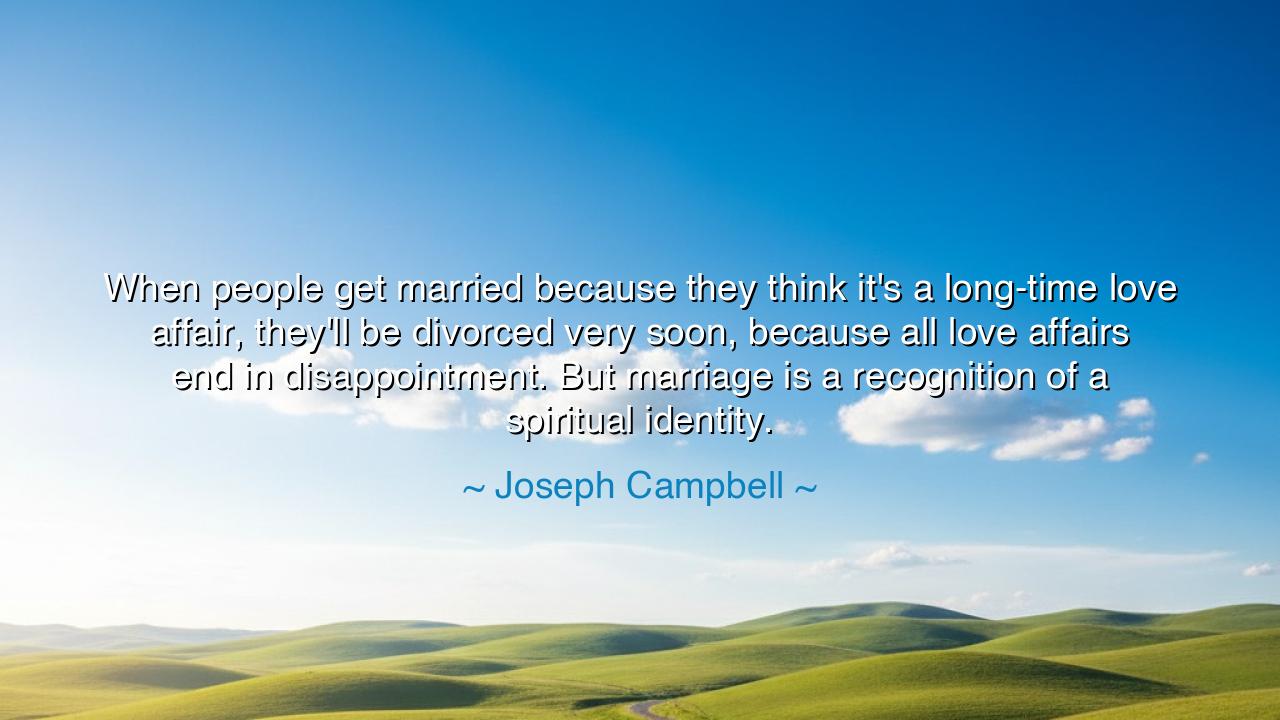
When people get married because they think it's a long-time love
When people get married because they think it's a long-time love affair, they'll be divorced very soon, because all love affairs end in disappointment. But marriage is a recognition of a spiritual identity.






When Joseph Campbell proclaimed, “When people get married because they think it’s a long-time love affair, they’ll be divorced very soon, because all love affairs end in disappointment. But marriage is a recognition of a spiritual identity,” he pierced through the illusions of passion to reveal the deeper truth of union. His words are not meant to diminish the beauty of love affairs, but to show that passion alone, though fiery and intoxicating, cannot sustain a covenant meant to endure. What begins with delight may end with disillusion if it rests only on the fleeting flame of desire. True marriage, he reminds us, is not merely the extension of romance, but the profound recognition of a shared soul, a joining of spirits beyond time.
The meaning of this quote lies in its distinction between love affairs and marriage. A love affair is often a dance of passion, a whirlwind of longing, where the self is swept away in the intoxication of another. Yet such passions fade, as all earthly fires do, leaving behind ashes of disappointment if nothing greater takes root. Marriage, however, is not simply passion extended; it is the acknowledgment of a spiritual identity—a bond where two souls recognize one another as mirrors of the eternal, companions on the sacred path of life. Where passion is fleeting, identity is enduring; where affairs end, marriage, if rightly founded, becomes timeless.
The origin of Campbell’s insight can be found in his lifelong study of myth and religion. He saw in stories from every culture that marriage was never merely a social contract, but a sacred rite. In Hindu myth, Shiva and Parvati unite not only as lovers but as divine counterparts, embodying the balance of masculine and feminine energies. In Christian sacrament, marriage is called a mystery, where the visible love of two is a reflection of divine love itself. Campbell’s wisdom is born from this universal truth: that marriage must be rooted not in the temporary fire of romance, but in the eternal recognition of spirit.
History offers us the example of Marcus Aurelius and Faustina, whose marriage endured through trials of empire, war, and personal hardship. Though history records Faustina’s faults and Aurelius’s burdens, their union endured because it was grounded not in the fleeting pleasure of passion but in shared purpose and mutual recognition. Aurelius, a philosopher-emperor, wrote of enduring life’s struggles with patience and unity; this strength was reflected in the endurance of his marriage. They remind us that marriage is not about the endless renewal of passion, but about the deep recognition of another’s essence and the choice to walk life’s path together.
The wisdom of Campbell’s words is a warning and a promise. The warning: those who enter marriage thinking it is only the endless continuation of romance will soon be disillusioned, for no fire burns forever without tending, and no passion survives unchanged. The promise: those who enter marriage as a recognition of spiritual identity, as the union of two souls who see one another’s truth, will find a bond that endures storms and grows deeper with time. For such a marriage is not founded on shifting feelings, but on the eternal ground of shared spirit.
The lesson here is profound: if you seek marriage, do not seek only passion, for passion will pass. Seek instead the recognition of the spirit within the other—their values, their truth, their essence. Know that marriage is not the endless ecstasy of romance, but the sacred labor of walking together, of healing, of growing, of carrying one another’s burdens and joys. To see marriage rightly is to enter it with reverence, not illusion, with humility, not fantasy.
What then must the listener do? Cultivate love not only of the heart but of the soul. In your partner, look beyond beauty and charm to see the spirit that dwells within. Ask not only, “Do I love them today?” but, “Do I recognize in them a soul with whom I may walk the path of life?” Nurture passion, yes, but root your marriage in something deeper: the shared recognition of spiritual identity.
Remember always: love affairs end, but marriage—if true—becomes eternal. Campbell teaches us that marriage is not the prolonging of passion but the awakening of spirit. Pass this wisdom on, so that those who come after may not mistake the fleeting fire for the eternal flame, but may find in marriage not only romance, but the reflection of the divine.






AAdministratorAdministrator
Welcome, honored guests. Please leave a comment, we will respond soon